2006年5月人事部三级笔译真题练习
人事部三级笔译(CATTI)06.11英译汉真题

人事部三级笔译(CATTI)06.11英译汉真题人事部三级笔译(CATTI)2006.11英译汉真题For all the natural and man-made disasters of the past year, travelers seem more determined than ever to leave home.Never mind the tsunami devastation in Asia last December, the recent earthquake in Kashmir or the suicide bombings this year in London and Bali, among other places on or off the tourist trail. The number of leisure travelers visiting tourist destinations hit by trouble has in some cases bounced back to a level higher than before disaster struck.A"This new fast recovery of tourism we are observing is kind of strange," said John Koldowski, director for the Strategic Intelligence Center of the Bangkok-based Pacific Asia Travel Association. "It makes you think about the adage that any publicity is good publicity."It is still too soon to compile year-on-year statistics for the disasters of the past 12 months, but travel industry experts say that the broad trends are already clear. Leisure travel is expected to increase by nearly 5 percent this year, according to the World Tourism and Travel Council."Tourism and travel now seem to bounce back faster and higher each time there is an event of this sort," said Ufi Ibrahim,vice president of the London-based World T ourism and Travel Council. For London, where suicide bombers killed 56 and wounded 700 on July 8, she said, "It was almost as if people who stayed away after the bomb attack then decided to come back twice."Early indicators show that the same holds true for other disaster-struck destinations. Statistics compiled by the Pacific Asia Travel Association, for example, show that monthly visitor arrivals in Sri Lanka, where the Dec. 26, 2004, tsunami left more than 30,000 people dead or missing, were higher than one year earlier for every month from March through August of this year.A case commonly cited by travel professionals as an early example of the trend is Bali, where 202 people were killed in bombings targeting Western tourists in October 2002. Visitor arrivals plunged to 993,000 for the year after the bombing, but bounced back to 1.46 million in 2004, a level higher than the two years before the bomb, according to the Pacific Asia Travel Association.Even among Australians, who suffered the worst casualties in the Bali bombings, the number of Bali-bound visitors bounced back within two years to the highest level since 1998, according the Pacific Asia Travel Association. Bali was hit again this year by suicide bombers who killed 19 people in explosions at three restaurants.Visits are also on the upswing to post-tsunami Thailand, where the giant waves killed 5,400 and left more than 5,000missing.Although the tsunami killed more than 500 Swedes on the Thai resort island of Phuket, the largest number of any foreign nationality to die, Swedes are returning to the island in larger numbers than last year, according to My Travel Sweden, a Stockholm-based group that sends 600,000 tourists o verseas annually and claims a 28 percent market share for Sweden."We were confident that Thailand would eventually bounce back as a destination, but we didn"t think that this year it would come back even stronger than last year," said Joakim Eriksson, director of communication for My Travel Sweden. "We were very surprised because we really expected a significant decline." Eriksson said My Travel now expects a 5 percent increase in visitors to both Thailand and Sri Lanka this season compared with the same season last year. This behavior is a sharp change from the patterns of the 1990s, Eriksson said. "During the first Gulf war we saw a sharp drop in travel as a whole, and the same after Sept. 11," Eriksson said. "Now the main impact of terrorism or disasters is a change in destination."。
06-10三级笔译翻译实务真题
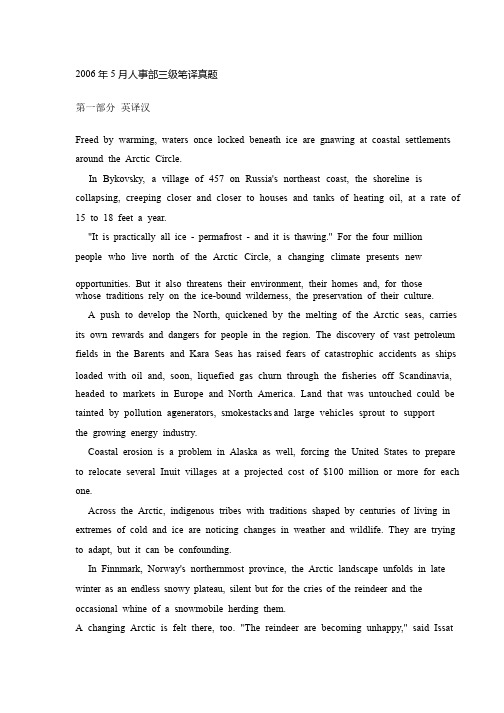
2006年5月人事部三级笔译真题第一部分第一部分 英译汉英译汉Freed by warming, waters once locked beneath ice are gnawing at coastal settlements around the Arctic Circle. In In Bykovsky, Bykovsky, a a village village village of of of 457 457 457 on on on Russia's Russia's Russia's northeast northeast northeast coast, coast, coast, the the the shoreline shoreline shoreline is is collapsing, creeping closer and closer to houses and tanks of heating oil, at a rate of 15 to 18 feet a year. "It "It is is is practically practically practically all all all ice ice ice - - - permafrost permafrost permafrost - - - and and and it it it is is is thawing." thawing." thawing." For For For the the the four four four million million people who live north of the Arctic Circle, a changing climate presents new opportunities. opportunities. But But But it it it also also also threatens threatens threatens their their their environment, environment, environment, their their their homes homes homes and, and, and, for for for those those whose traditions rely on the ice-bound wilderness, the preservation of their culture. A push to develop the North, quickened by the melting of the Arctic seas, carries its own rewards and dangers for people in the region. The discovery of vast petroleum fields in the Barents and Kara Seas has raised fears of catastrophic accidents as ships loaded with oil and, soon, liquefied gas churn through the fisheries off Scandinavia, headed to markets in Europe and North America. Land that was untouched could be tainted by pollution as generators, smokestacks and large vehicles sprout to support the growing energy industry. Coastal erosion is a problem in Alaska as well, forcing the United States to prepare to relocate several Inuit villages at a projected cost of $100 million or more for each one. Across the Arctic, indigenous tribes with traditions shaped by centuries of living in extremes of cold and ice are noticing changes in weather and wildlife. They are trying to adapt, but it can be confounding. In Finnmark, Norway's northernmost province, the Arctic landscape unfolds in late winter winter as as as an an an endless endless endless snowy snowy snowy plateau, plateau, plateau, silent silent silent but but but for for for the the the cries cries cries of of of the the the reindeer reindeer reindeer and and and the the occasional whine of a snowmobile herding them. A changing Arctic is felt there, too. "The reindeer are becoming unhappy," said Issat Eira, a 31-year-old reindeer herder. Few Few countries countries countries rival rival rival Norway Norway Norway when when when it it it comes comes comes to to to protecting protecting protecting the the the environment environment environment and and preserving indigenous customs. The state has lavished its oil wealth on the region, and Sami culture has enjoyed something of a renaissance. And And yet yet yet no no no amount amount amount of of of government government support support can can can convince convince Mr. Eira Eira that that that his his livelihood, livelihood, intractably intractably intractably entwined entwined entwined with with with the the the reindeer, reindeer, reindeer, is is is not not not about about about to to to change. change. change. Like Like Like a a Texas cattleman, he keeps the size of his herd secret. But he said warmer temperatures in in fall fall fall and and and spring spring spring were were were melting melting melting the the the top top top layers layers layers of of of snow, snow, snow, which which which then then then refreeze refreeze refreeze as as as ice, ice, making it harder for his reindeer to dig through to the lichen they eat. "The people who are making the decisions, they are living in the south and they are are living living living in in in towns," towns," towns," said said said Mr. Mr. Mr. Eira, Eira, Eira, sitting sitting sitting inside inside inside his his his home home home made made made of of of reindeer reindeer reindeer hides. hides. "They don't mark the change of weather. It is only people who live in nature and get resources from nature who mark it." A push to develop the North, quickened by the melting of the Arctic seas, carries its own rewards and dangers for people in the region. The discovery of vast petroleum fields in the Barents and Kara Seas has raised fears of catastrophic accidents as ships loaded with oil and, soon, liquefied gas churn through the fisheries off Scandinavia, headed to markets in Europe and North America. Land that was untouched could be tainted by pollution as generators, smokestacks and large vehicles sprout to support the growing energy industry. 第二部分第二部分 汉译英汉译英维护世界和平,促进共同发展,谋求合作共赢,是各国人民的共同愿望,也是不可抗拒的当今时代潮流。
人事部三级笔译
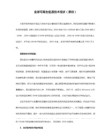
卡里·福勒是一家负责管理种子库的非营利性组织全球作物多样性托管会的总裁,他说:“我们是在‘9·11’事件之后、尤其是卡特里娜飓风之后,开始有这个构想的。” 他还说:“每个人都在问:为什么事先不作好迎接飓风的准备呢?我们明明知道会发生飓风的。”
8.“Well, we are losing biodiversity every day — it’s a kind of drip, drip, drip. It’s also inevitable. We need to do something about it.”
他指出:“喏,我们每天都在损失生物多样性——一点一滴地在损失。这种损失没有止步的迹象,我们必须为此做点什么。”
9.This week the urgency of the problem was underscored as wheat prices rose to record highs and wheat stores dropped to the lowest level in 35 years. A series of droughts and new diseases cut wheat production in many parts of the world. “The erosion of plants’ genetic resources is really going fast,” said Dr. Rony Swennen, head of the division of crop biotechnology at the Catholic University of Leuven in Belgium, who has preserved half of the world’s 1,200 banana types. “We’re at a critical moment and if we don’t act fast, we’re going to lose a lot of plants that we may need.”
2006年5月翻译资格英语高级口译实务真题及答案

2006年5月翻译资格英语高级口译实务真题及答案试卷一Part ADirections: In this part of the test, you will hear 2 passages in English. After you have heard each paragraph, interpret it into Chinese. Start interpreting at the signal…and stop it at thesignal… You may take notes while you are listening. Remember you will hear the passages only once. Now let’s begin Part A with the first passage.Passage 1:Some people say that the United States is “a melting pot”. In my view, the melting pot myth is never true. The United States has always been a heterogeneous society with cohesion based partly on mutual respect and partly on one group’s values dominating all others. In a true multicultural society, individuals from diverse cultural backgrounds exist without socially enforced power differences. But that is not the case, at least, with the United States.In the United States, when you speak of upper, middle and lower classes you speak of power and control over material resources. Economic power in the United States today is largely held by youthful, able-bodied White males. Whites in the United States recognize the existence of a White culture. In terms of cross-cultural communication, the dominant White culture includes communication patterns of Standard English, direct eye contact, limited physical contact, and controlled emotions.(参考答案)有人说美国是熔炉,以我所见,有关熔炉之说从来就是一种虚构的神话。
2006年5月人力资源管理师三级真题
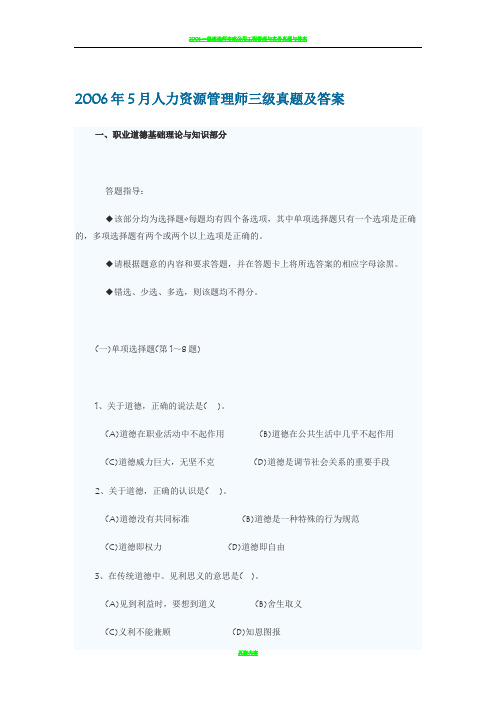
2006年5月人力资源管理师三级真题及答案一、职业道德基础理论与知识部分答题指导:◆该部分均为选择题•每题均有四个备选项,其中单项选择题只有一个选项是正确的,多项选择题有两个或两个以上选项是正确的。
◆请根据题意的内容和要求答题,并在答题卡上将所选答案的相应字母涂黑。
◆错选、少选、多选,则该题均不得分。
(一)单项选择题(第1~8题)1、关于道德,正确的说法是( )。
(A)道德在职业活动中不起作用(B)道德在公共生活中几乎不起作用(C)道德威力巨大,无坚不克(D)道德是调节社会关系的重要手段2、关于道德,正确的认识是( )。
(A)道德没有共同标准(B)道德是一种特殊的行为规范(C)道德即权力(D)道德即自由3、在传统道德中。
见利思义的意思是( )。
(A)见到利益时,要想到道义(B)舍生取义(C)义利不能兼顾(D)知恩图报4、人的本性是( )。
(A)善(B)自私(C)自然属性和社会属性的统一(D)追求财富5、职业道德的特征是( )。
(A)范围上的有限性(B)规范制定上的任意性(C)内容上的多变性(D)形式上的单一性6、在企业文化中,居于核心地位的是( )。
(A)文体活动(B)企业价值观(C)企业礼俗(D)员工服饰7、关于企业品牌,正确的认识是( )。
(A)品牌是依靠大规模广告宣传出来的(B)品牌是企业的一种无形资本(c)品牌形象树立起来以后,自然会长久维持(D)品牌的建立与员工个人不存在直接关系8、职业道德与员工技能的关系是( )。
(A)企业选人的标准通常是技能高于职业道德(B)没有职业道德的人,无论技能如何,无法充分发挥其自身价值(C)只要技能上去了。
就表明职业道德素质相应地提高了(D)职业道德注重的是员工的内在修养,而不包含职业技能(二)多项选择题(第9~16题)9、属于正确荣辱观范畴的是( )。
(A)以服务人民为荣,以背离人民为耻(B)以辛勤劳动为荣,以好逸恶劳为耻(C)以遵纪守法为荣,以违法乱纪为耻(D)以节衣缩食为荣,以浪费资源为耻10、在社会主义社会,文明生产的要求是( )。
CATTI三级笔译综合能力真题和答案及解析
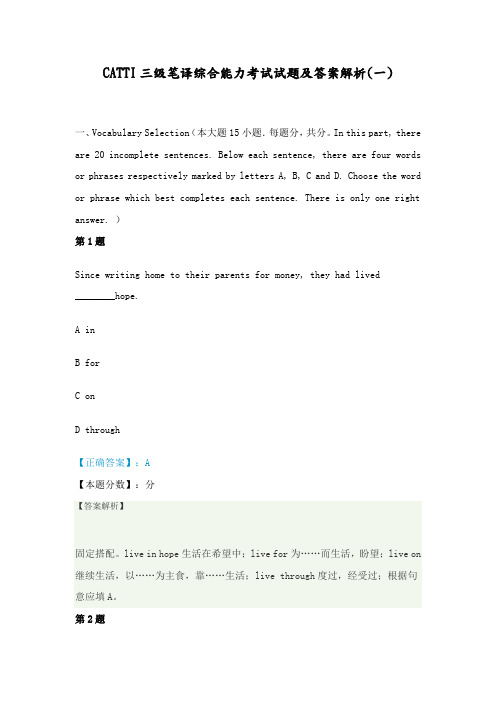
CATTI三级笔译综合能力考试试题及答案解析(一)一、Vocabulary Selection(本大题15小题.每题分,共分。
In this part, there are 20 incomplete sentences. Below each sentence, there are four words or phrases respectively marked by letters A, B, C and D. Choose the word or phrase which best completes each sentence. There is only one right answer. )第1题Since writing home to their parents for money, they had lived________hope.A inB forC onD through【正确答案】:A【本题分数】:分【答案解析】固定搭配。
live in hope生活在希望中;live for为……而生活,盼望;live on 继续生活,以……为主食,靠……生活;live through度过,经受过;根据句意应填A。
第2题________get older, the games they play become increasingly complex.A ChildrenB Children, when theyC As childrenD For children to【正确答案】:C【本题分数】:分【答案解析】语法应用。
本句逗号前是状语从句,空白处应填连词;主句主语是the games,因此选项A、B、D均不对;只有as“随着”符合句意,所以C为答案。
第3题Martin has created enough memorable ________to make it easy to forgive his lows.A youngstersB noblesC highsD miserables【正确答案】:C【本题分数】:分【答案解析】固定搭配。
CATTI人事部翻译考试 三级笔译实务真题及答案2006.5
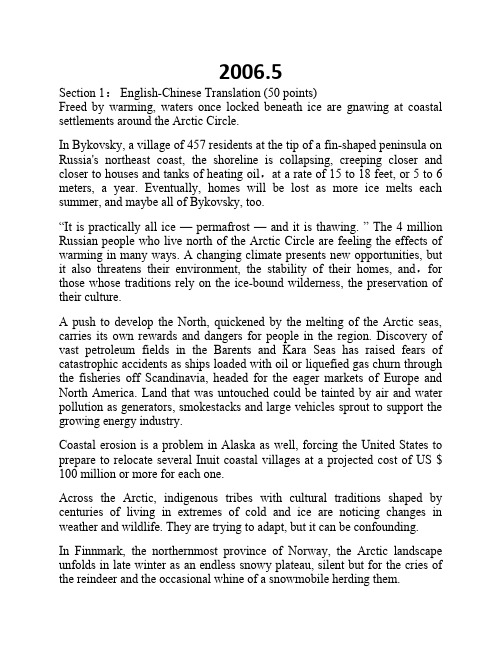
2006.5Section 1: English-Chinese Translation (50 points)Freed by warming, waters once locked beneath ice are gnawing at coastal settlements around the Arctic Circle.In Bykovsky, a village of 457 residents at the tip of a fin-shaped peninsula on Russia's northeast coast, the shoreline is collapsing, creeping closer and closer to houses and tanks of heating oil,at a rate of 15 to 18 feet, or 5 to 6 meters, a year. Eventually, homes will be lost as more ice melts each summer, and maybe all of Bykovsky, too.“It is practically all ice — permafrost — and it is thawing. ” The 4 million Russian people who live north of the Arctic Circle are feeling the effects of warming in many ways. A changing climate presents new opportunities, but it also threatens their environment, the stability of their homes, and,for those whose traditions rely on the ice-bound wilderness, the preservation of their culture.A push to develop the North, quickened by the melting of the Arctic seas, carries its own rewards and dangers for people in the region. Discovery of vast petroleum fields in the Barents and Kara Seas has raised fears of catastrophic accidents as ships loaded with oil or liquefied gas churn through the fisheries off Scandinavia, headed for the eager markets of Europe and North America. Land that was untouched could be tainted by air and water pollution as generators, smokestacks and large vehicles sprout to support the growing energy industry.Coastal erosion is a problem in Alaska as well, forcing the United States to prepare to relocate several Inuit coastal villages at a projected cost of US $ 100 million or more for each one.Across the Arctic, indigenous tribes with cultural traditions shaped by centuries of living in extremes of cold and ice are noticing changes in weather and wildlife. They are trying to adapt, but it can be confounding.In Finnmark, the northernmost province of Norway, the Arctic landscape unfolds in late winter as an endless snowy plateau, silent but for the cries of the reindeer and the occasional whine of a snowmobile herding them.A changing Arctic is felt there, too, though in another way. "The reindeer are becoming unhappy," said Issat Eira, a 31-year-old reindeer herder.Few countries rival Norway when it comes to protecting the environment and preserving indigenous customs. The state has lavished its oil wealth on the region, and as a result Sami culture has enjoyed something of a renaissance. And yet no amount of government support can convince Eira that his livelihood, intractably entwined with the reindeer, is not about to change. Like a Texas cattleman he keeps the size of his herd secret. But he said warmer temperatures in fall and spring are melting the top layers of snow,which then refreeze as ice, making it harder for his reindeer to dig through to the lichen they eat."The people who are making the decisions, they are living in the south and they are living in towns,”said Eira, sitting beside a birch fire inside his lavvu, a home made of reindeer hides. "They don't mark the change of weather. It is only people who live in nature and get resources from nature who mark it. ”Section 2: Chinese-English Translation (50 points)维护世界和平,促进共同发展,谋求合作共赢,是各国人民的共同愿望,也是不可抗拒的当今时代潮流。
三级笔译练习题

三级笔译练习题一、英译汉1. Translate the following sentences into Chinese:a) The rapid development of technology has greatly facilitated our daily lives.2. Translate the following paragraphs into Chinese:二、汉译英1. Translate the following sentences into English:a) 我国高度重视教育事业的发展。
b) 绿色出行,从我做起。
c) 全面深化改革,促进社会公平正义。
2. Translate the following paragraphs into English:a) 随着我国经济的持续增长,人民生活水平不断提高,消费需求也日益多样化。
为了满足人民群众的美好生活需要,我们要不断推进供给侧结构性改革。
b) 传统文化是一个国家的灵魂,我们要传承和弘扬中华民族优秀传统文化,为中华民族伟大复兴提供精神动力。
三、词汇翻译1. Translate the following terms into Chinese:a) globalizationc) artificial intelligenced) public welfaree) sustainable development2. Translate the following terms into English:a) 一带一路b) 新能源汽车c) 5G网络d) 知识产权e) 低碳经济四、篇章翻译1. Translate the following article into Chinese:(English article excerpt)2. Translate the following article into English:(Chinese article excerpt)五、翻译技巧练习1. Translate the following sentences using appropriate translation techniques:a) He is as brave as a lion.2. Translate the following sentences using the method of literal translation:a) 眼见为实。
- 1、下载文档前请自行甄别文档内容的完整性,平台不提供额外的编辑、内容补充、找答案等附加服务。
- 2、"仅部分预览"的文档,不可在线预览部分如存在完整性等问题,可反馈申请退款(可完整预览的文档不适用该条件!)。
- 3、如文档侵犯您的权益,请联系客服反馈,我们会尽快为您处理(人工客服工作时间:9:00-18:30)。
2006年5月人事部三级笔译真题第一部分英译汉471 (比新大纲要求的要少)第一遍译文:在北极圈,由于气候变暖,冰层下的水正在融化,这困扰着沿岸的居民。
在俄罗斯北部海岸,有个叫贝科夫斯基的村子,其共有村民457人。
这里的海岸线正在塌陷,以每年15-18英尺的速度慢慢逼近民宅和燃料桶。
所有的冰和冻土都是有实际作用的。
现在他们却在融化。
对于居住在北极圈北部的居民来说,虽然气候变化是个新的契机,但同时也在威胁着他们的生存环境,家庭,以及那些依存于冰上荒原生活产生的传统文化。
随着北极圈不断融化,人们加快了对北极圈的开发。
这对于生活在这一区域的居民来说是利弊共存的。
在巴伦支海和喀拉海发现了油田。
这让人们对可能发生的灾难性事故产生了恐慌。
因为,很快,满载着石油,液化气罐的货轮将穿过斯堪的纳维亚的捕鱼区,前往欧洲和北美的销售市场。
那些尚未开发的土地,也可能会被发电机,烟囱,大型交通工具散发出来的废物所污染。
而这些都是都是用来发展能源产业的。
在阿拉斯加,海岸侵蚀也成为了一个大问题,美国政府不得不重新安置几个纽因特人的村落,这个项目为每个村落的花费高达一亿美元甚至更多。
在整个北极地带,生存着许多原始部落,他们的文化形成于几个世纪以来的极端寒冷环境下的冰上生活。
他们已经注意到了气候和野生生物都发生了变化。
这些居民们正在适应这些变化,但是这个过程很让人沮丧。
在挪威北部的纽马克省,深冬时节,北极的美景在这里一览无遗。
无尽的高原,白雪皑皑,寂静无声,但能听到驯鹿的叫声,以及偶尔传来的雪地车的声音,这些车是放牧用的。
然而北极的变化在这里也有所体现,31岁的牧民伊萨特艾勒说:“驯鹿变得越来越不安了。
”挪威将进行环境和文化保护,少有国家能与之竞争。
这一区域的石油大量开采,萨米文化得到复兴。
艾勒的生计是与驯鹿密切相关的,但政府不能提供任何帮助来保持艾勒的生活不变。
像德克萨斯的一位牧场主一样,艾勒偷偷的保有一定数量的鹿群。
但他说秋天气候温暖,泉水将最上层的雪融化,这些雪水会再次结冰,这使得驯鹿很难挖开冰层找到他们吃的地衣。
“做决定的这些人都是住在南部和城市”艾勒坐在鹿皮搭建的房子里说:“他们感受不到气候的变化。
只有那些生活在自然界,从自然界中得到资源的人才能意识到气候的变化。
”第二遍译文:在北极圈,由于气候变暖,冰层下的一些海域正在融化,这困扰着沿岸的居民。
在俄罗斯北部海岸的贝科夫斯基村共有村民457人。
这里的海岸线正在塌陷,以每年15-18英尺的速度慢慢逼近民宅和燃料桶。
所有的冰和冻土都是有实际作用的。
现在他们却在融化。
对于居住在北极圈北部的居民来说,虽然气候变化是个新的契机,但同时也在威胁着他们的生存环境,家庭,以及对依存于野外冰上生活而产生的习俗的保护随着北冰洋不断融化,人们加快了对北极圈的开发。
这对于生活在这一区域的居民来说是利弊共存的。
在巴伦支海和喀拉海发现了油田。
这让人们对可能发生的灾难性事故产生了恐慌。
因为,在那不久,满载着石油,液化气罐的货轮将穿过斯堪的纳维亚的捕鱼区,前往欧洲和北美的销售市场。
为了支持能源业的发展,发电站,烟囱,大型交通工具都会大量涌现,那些尚未被开采的土地也会因此受到污染。
在阿拉斯加,海岸侵蚀也成为了一个大问题,美国政府不得不准备重新安置几个纽因特人的村落,这个项目为每个村落的花费高达一亿美元甚至更多。
在整个北极地带,生存着许多原始部落,他们的文化形成于几个世纪以来在极端寒冷环境下的冰上生活。
他们已经注意到了气候和野生生物都发生了变化。
这些居民们正在适应这些变化,但是这个过程很让人惊讶的。
在挪威最北部的纽马克省,深冬时节,北极的美景在这里一览无遗。
无尽的高原,白雪皑皑,寂静无声,但能听到驯鹿的叫声,以及偶尔传来用于聚拢驯鹿的雪地车声。
然而北极的变化在这里也有所体现,31岁的牧民伊萨特艾勒说:“驯鹿变得越来越不安了。
”挪威将进行环境和文化保护,少有国家能与之竞争。
政府将大量的石油财富给了这个地区,并且萨米文化得到复兴。
艾勒的生计是与驯鹿密切相关的,但政府不能提供任何证据使艾勒相信他的生活不会改变。
像德克萨斯的一位牧场主一样,艾勒偷偷的保有一定数量的鹿群。
但他说秋天气候温暖,泉水将最上层的雪融化,这些雪水会再次结冰,这使得驯鹿很难挖开冰层找到他们吃的地衣。
“做决定的这些人都是住在南部和城市”艾勒坐在鹿皮搭建的房子里说:“他们感受不到气候的变化。
只有那些生活在自然界,从自然界中得到资源的人才能意识到气候的变化。
”自我分析:一.原文:Freed by warming, waters once locked beneath ice are gnawing at coastal settlements around the Arctic Circle.译文:在北极圈,由于气候变暖,冰层下的一些海域正在融化,困扰着沿岸的居民。
分析1. Freed by warming,这个不知道怎么翻译好,分词作状语,我觉得是原因状语2.Because waters free by warming, waters …….3.Water 的复数指海域waters [plural] a large area of water, especially an ocean that is near or belongs to a particular country:The coastal waters of AlaskaKorean/Mexican/Pacific etc watersThe ship drifted into Turkish territorial waters.a species found in inland waters (=not the sea, but rivers, lakes etc)4. gnawing:[only before noun]worrying or painful, especially for a long time:gnawing doubts ……………………………………………………………………………………………..二:原文:In Bykovsky, a village of 457 on Russia's northeast coast, the shoreline is collapsing, creeping closer and closer to houses and tanks of heating oil, at a rate of 15 to 18 feet a year.译文:在俄罗斯北部海岸的贝科夫斯基村共有村民457人。
这里的海岸线正在塌陷,以每年15-18英尺的速度慢慢逼近民宅和燃料桶。
分析:1. Bykovsky 贝科夫斯基网上查的是个名字2. tanks of heating oil翻译成燃料桶很别扭………………………………………………………………………………..三:原文:"It is practically all ice - permafrost - and it is thawing." For the four million people who live north of the Arctic Circle, a changing climate presents new opportunities. But it also threatens their environment, their homes and, for those whose traditions rely on the ice-bound wilderness, the preservation of their culture.译文:“所有的冰和冻土都是有实际作用的。
现在他们却在融化。
”对于居住在北极圈北部的居民来说,虽然气候变化是个新的契机,但同时也在威胁着他们的生存环境,家庭,以及依存于冰上荒原生活产生的传统文化的人们去保护他们的文化。
(以及对依存于野外冰上生活而产生的习俗的保护)这里好像怎么说都有点拗口分析:1. Permafrost 冻土2. - permafrost –加了标点,有点迷茫,这里是同位语呢,还是什么。
我觉得冰不是冻土吧。
但是要是并列意思也不用加标点吧3. Thawingif ice or snow thaws, or if the sun thaws it, it turns into water4. for those whose traditions rely on the ice-bound wilderness, the preservation of their culture. Those 后面是定语,定语不是太长,应该前置这个句子,前面and后面应该是the preservation of their culture.文化保护也受到了威胁。
And后面的句子是不是这样理解的And the preservation of their culture for those whose traditions rely on the ice-bound wilderness. 但同时也在威胁着他们的生存环境,家庭以及文化保护。
这些文化产生于野外的冰上生活。
5. ice-bound wilderness.这个不知道怎么翻译好………………………………………………………………………………….四:原文:A push to develop the North, quickened by the melting of the Arctic seas, carries its own rewards and dangers for people in the region. The discovery of vast petroleum fields in the Barents and Kara Seas has raised fears of catastrophic accidents as ships loaded with oil and, soon, liquefied gas churn through the fisheries off Scandinavia, headed to markets in Europe and North America. Land that was untouched could be tainted by pollution as generators, smokestacks and large vehicles sprout to support the growing energy industry.译文:随着北冰洋不断融化,人们加快了对北极圈的开发。
